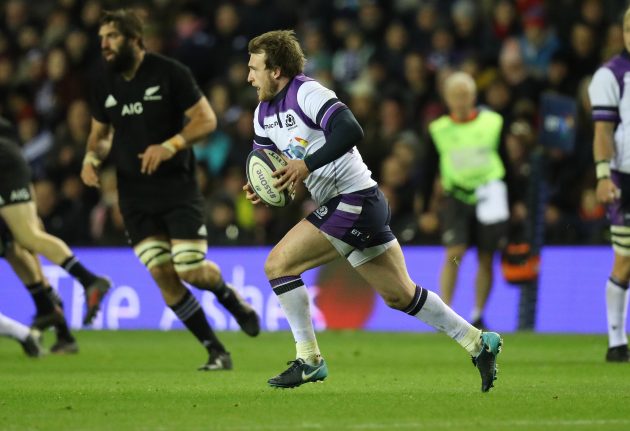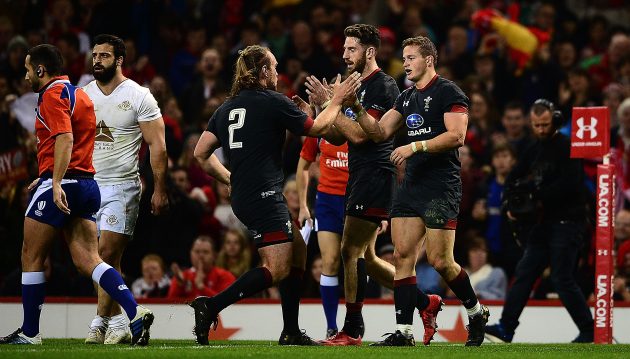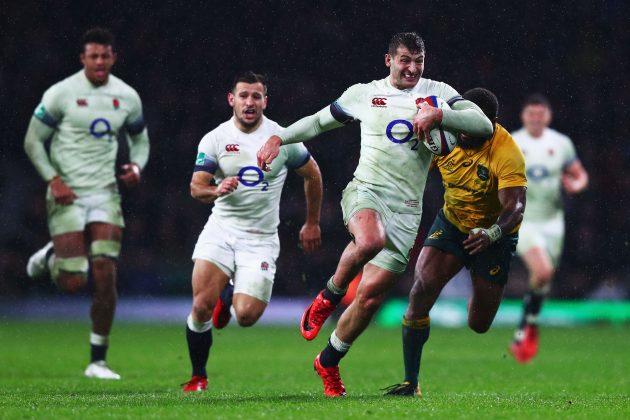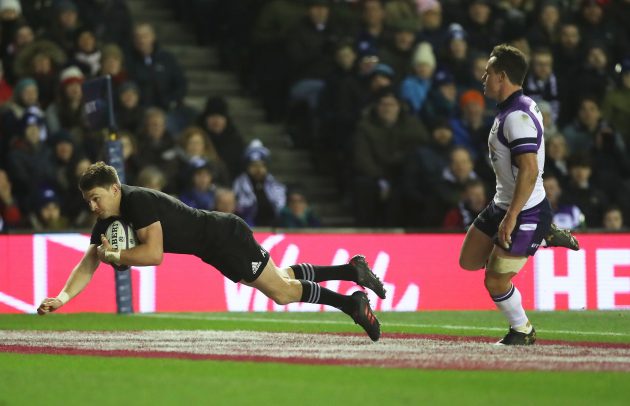Scotland almost pulled off a miraculous win over New Zealand, England capitalised on their luck against Australia while Wales and Ireland just inched to wins – we look at the big talking points from the second week of autumn Internationals
Wales 13-6 Georgia
- Wales started brightly, making bursts in midfield, fizzing the ball wide and with Rhys Priestland pulling the strings at ten, so when Hallam Amos crossed in the 19th minute it looked promising for the hosts. But then, as Dan Lydiate described it, “we got dragged into an arm wrestle” and it looked like Georgia might level the scores in the final minutes when they won a penalty and Tomas Francis was sin-binned. With starting tighthead Leon Brown injured, though, it went to uncontested scrums, the visitors opted for a five-metre lineout and, after several phases, conceded a penalty that brought an end to the game.
- The end of the game was farcical. The confusion caused around the move to uncontested scrums went on for several minutes and the crowd grew restless. Eyebrows were certainly raised over the decision given that Leon Brown was seen on the touchline appearing to warm up. Yet Warren Gatland said Brown was suffering cramp when he came off, even though it wasn’t why he was substituted, and that the cramp had got more severe while he was on the sidelines. “I can promise you there wasn’t anything from our point of view in terms of trying to manipulate the laws,” said the Wales coach.

A single highlight: Hallam Amos of Wales( far right) celebrates his score
- Milton Haig, the Georgia coach, was confident his team would have scored had a contested five-metre scrum in the closing minutes gone ahead given that Wales were a man down and said: “We would have backed ourselves for sure.” After all, ten minutes earlier they had a series of scrums five metres out from the Wales posts and looked close to being awarded a penalty try, before Wales won the penalty at the fourth scrum.
- The whole series of events raised several questions. Aside from the uncontested scrums, Georgia changed their decision as to what they wanted to do from that final penalty after the referee had signaled for a scrum, which is another issue altogether. World Rugby said: “All matches are reviewed, including match official, performance reviewer and coach feedback. It would be inappropriate to comment until the facts have been obtained and the review has been undertaken.”
FOR THE LATEST SUBSCRIPTION OFFERS, CLICK HERE
- Moving on from the controversy at the end, this was not a good game of rugby, yet Georgia showed how good a side they are. It’s not just their physicality up front that stood out; they were organised in defence and had a decent kicking game too. As Haig said, they will have benefited from this experience of playing a Tier One team.
- As for Wales, there were glimpses early on of what they were trying to do, but their penchant for throwing miss-passes wasn’t always effective as the slow movement of the ball allowed Georgia’s defence to move across and tackle the receiver.

Happy chappy: Danny Care of England scores a a try to punish Australia
England 30-6 Australia
- This was a game with so many marginal calls to be made by the officials – with 28-year-old referee Ben O’Keefe at the centre of it all – and Australia continually fell on the wrong side of the decisions. The most notable call were to chalk off a Marika Koroibete score due to a perceived obstruction by replacement hooker Stephen Moore as Chris Robshaw tried to tackle and then hold up the ball. Elliot Daly also scored a try where the kick ahead tickled the touchline but was judged to have remained in after several replays. Considering there were two yellow cards (one for Michael Hooper and one for Kurtley Beale) and Hooper also had a try disallowed just after the opening quarter because Hooper was ahead of play, you can understand why head coach Michael Cheika was less than thrilled with what was happening on the field.
- The score-line looks flattering for England, but the English ran away with it in the closing stages of the match. With Australia looking like they wouldn’t get the rub of the green, England’s backs must get credit for their ruthlessness. If Daly’s try was fortuitous, Jonathan Joseph’s score from a Danny Care box kick looked smart and Jonny May’s score from a sneaky Care grubber looked confident. When the replacement scrum-half finished off a move for England’s fourth try, after May collected his own chip, it all looked so impressively clinical from England.

On the hoof: Jonny May breaks clear
- Owen Farrell has been credited with talking round referee O’Keefe as the TMO was showing replays of Koroibete’s grounding. The fly-half was heard asking about Moore’s line, and despite frame after frame of new angles on the grounding, O’Keefe finally made the call of obstruction. Mind you, several Australian spectators were left questioning whether Robshaw had actually been offside a few phases before anyway.
- England’s locks were incredible. Joe Launchbury buzzed with activity and Courtney Lawes was a punishing force. With Maro Itoje an early substitution for Sam Underhill, seeing him charge around only highlighted the frightening competition for places in the English boiler house.
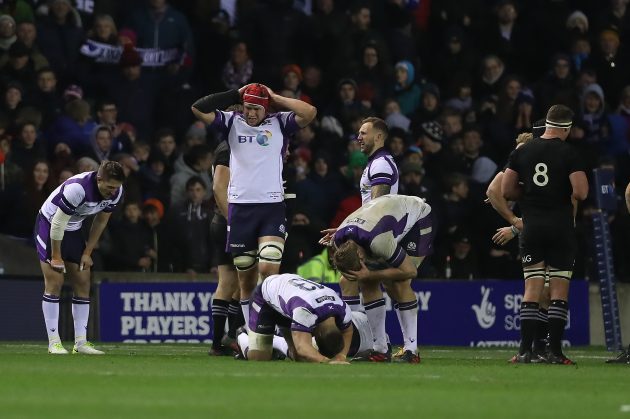
Almost there: The Scotland players realise they won’t win at the end
Scotland 17-22 New Zealand
- Scotland came so close to achieving history. With the last play of the game Stuart Hogg, the eventual man of the match who worried defenders every time he touched the ball, sliced through and looked for the outside edge. With Beauden Barrett zeroing in on Hogg, play moved ever closer to the Kiwi line. As Barrett just managed to reel in Hogg he looked to pass inside with one hand to the crowd pushing forward. But it was forward and the game ended, so tantalisingly close to a first-ever win for the hosts.
- This match had an incredible atmosphere. So often light displays, noise and videos can be confusing, distracting and ill-judged. However, this was pitched just right, and with Doddie Weir coming out with his family to present the match ball after the haka, there was a sense of something special.
The game also helped. It swayed from end to end, fizzing with all the energy of a proper Test. Scotland carried well and built phases, with Huw Jones and John Barclay shining throughout. Finn Russell and Ali Price shifted play and kicked smartly, while Hogg got the crowd on his feet.
New Zealand were by far the better scrum throughout. In the changing rooms after the match, assistant coach Mike Cron heaped praise in his pack, with a seven-man shove repelling the Scots so near their own line. The savage, cutting edge was also there for the All Blacks. Their three tries were clean and sharp, but Barrett’s try was one to remember – from a scrum, Sonny Bill Williams got it on the front foot. He offloaded out the back door to a motoring Damian McKenzie, who made a simple pass to the fly-half for the try. - Scotland’s game was all the more impressive as they suffered so many injuries in this game. In the first half Hamish Watson went off with a bad back. Luke Hamilton did well in his first cap, but then suffered an ankle injury. Hooker Stuart McInally moved into the back-row with Georg Turner coming on, but there were more problems. At half-time Zander Fagerson was replaced by Simon Berghan and early in the second, Alex Dunbar went off for Pete Horne.

Moment of brilliance: Beauden Barrett finishes a breathtaking move
- The All Blacks discipline was lacking. Waisake Naholo benefitted from leniency from the officials when a yellow card for tackling Hogg in the air was downgraded to just a penalty as Price initially stood in his way. But they received two yellows – one for Sam Cane and one for Wyatt Crockett – for murdering Scottish ball near the line. If they hadn’t done it, Scotland could have manufactured more than one burrow-over score like Jonny Gray’s, but they did what they could to cling on.
- After this one some were wondering if the close nature of this game had a greater significance. Asked about that, All Blacks coach Steve Hansen said: “Rugby’s in a good place. Everyone back home was telling us that they were getting bored of us being dominant. Well, they’ll just have to go away and have a cup of tea and think about that.”

Back to form: Cian Healy was one of a few standouts against Fiji
Ireland 23-20 New Zealand
- Ireland had to squeak by in this contest where Fiji were full of ambition but the hosts never clicked. They threw away a 17-3 lead, with the Fijians drawing level at the start of the second half.
- With 13 changes to the Ireland team that defeated South Africa the week before, it is no surprise that things didn’t click. It did not help that young Joey Carberry went off in the second with a suspected arm fracture, but while Darren Sweetnam shone on one wing, but the centres looked understandably like strangers and the pack were caught out at the ruck time and again.
Ian Keatley was eventually the man to ensure Irish victory, doing the business from the tee with two crucial penalty kicks.
The return to form of Cian Healy is at least one shining light. - Leone Nakarawa and Nemani Nadolo combined to create a fine try for Henry Senilolo – these players and Ben Volavola need to be acknowledged for their fine play. Nakarawa in particular must be in discussions whenever current world bests are discussed.





